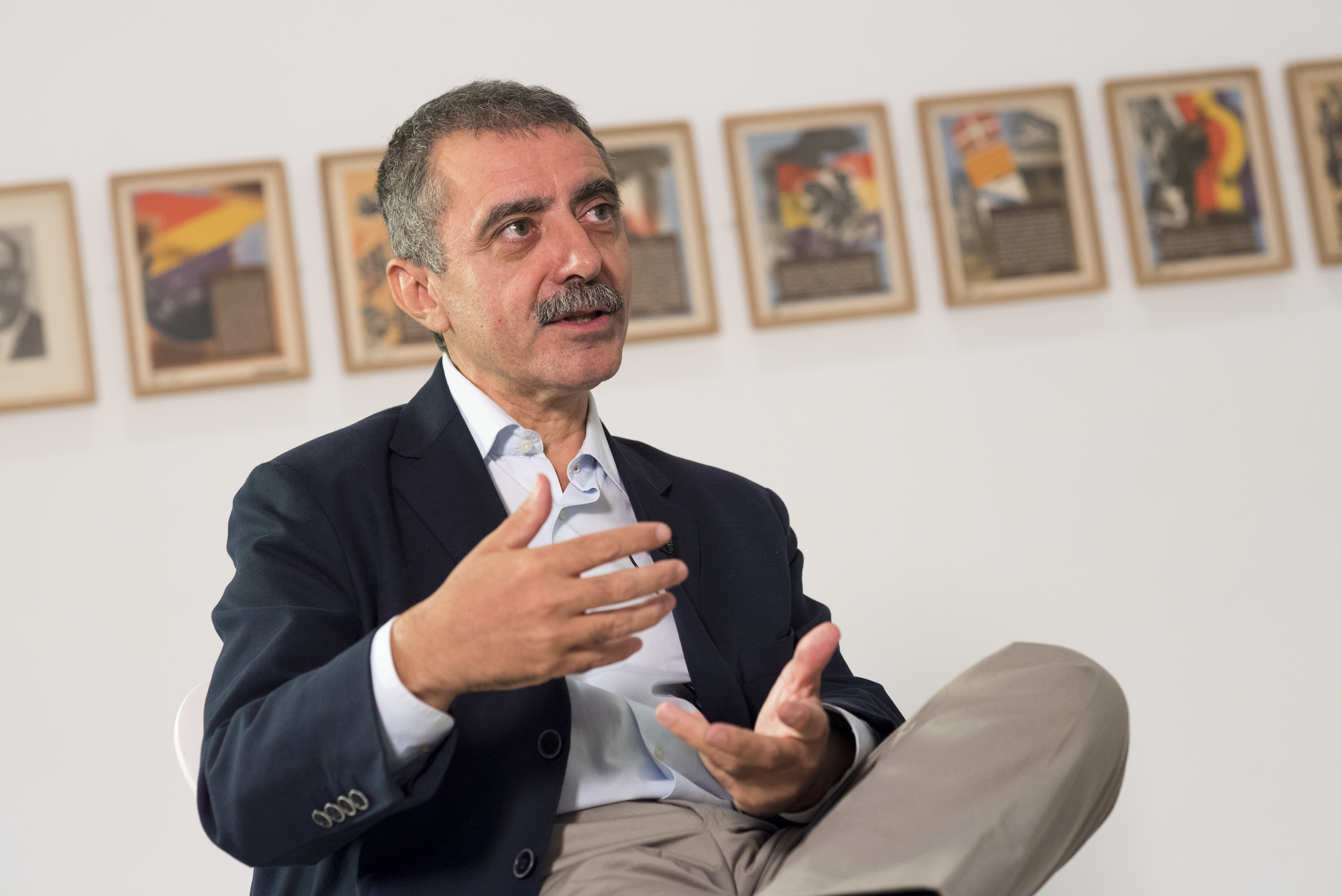The director of the Museo Reina Sofía reflects on art and knowledge in the UOC inaugural lecture
The lecture offered every year to inaugurate the UOC's new academic year was transferred this time to Madrid, where it was given by Manuel Borja-Villel, director of the Museo Reina Sofía. The art historian opened up one of the museum's most iconic rooms to the UOC, the Pavilion of the 1937 Spanish Republic, where Guernica is on display, to offer us some reflections on art and knowledge with fellow historian Joan Fuster-Sobrepere, dean of the UOC's Faculty of Arts and Humanities. The conversation between them, entitled Art and knowledge for the common good, can be seen in five themed videos that the University has published online.
-
"The museum cannot be separate from the university"
Manuel Borja-Villel comments on the need to reconsider the museum as an institution and to imagine it differently: "Works and knowledge belong to everyone and they must create a shared space". This is why, "in the twenty-first century, as it was in the Middle Ages and as it was in the seventeenth and eighteenth centuries, the museum cannot be separate from the university, from knowledge".
-
How are today's artists trained? The new UOC-Museo Reina Sofía Bachelor's Degree in Fine Art
Borja-Villel explains the reasons that have led the Museo Reina Sofía and the UOC to create a new online bachelor's degree in Fine Art: "Just like that of the intellectual or the curator, the role of the artist has changed in recent decades". Previously, "at schools of Fine Art, students studied technique", but nowadays "any artist works with video, paint, two-dimensional objects, space... and they are constantly changing focus. We no longer speak of disciplines and techniques, but of formats".
All in all, knowing how to train the artist of the present is key to the Museo Reina Sofía. "It is necessary to create a platform that permits other types of training," its director explained.
-
A connected museum
For Borja-Villel, the way of taking on a global market "is promoting a fabric of networks built around knowledge". And this is where technologies play a key role: "In a museum, digital is very important, as it enables global access" and, secondly, because "the importance of a museum is determined by the number of stories and the relationship that these stories permit".
-
"Guernica has a cinematic quality to it"
The conversation between the two historians has the privilege of sharing the room with Picasso's Guernica. For Borja-Villel, the painting "has a cinematic quality to it; it also has something to do with the public space, with the theatrical", adding, "We are interested in the reflection on the function of the public service of art, the public space and self-reflection on the devices themselves".
-
Cinema enters the museum
According to Borja-Villel, the introduction of cinema into the museum institution helps construct a popular culture in which "the spectator must be able to create their own stories".
There is no single truth or explanation. "What has always drawn me to museums, to exhibitions, is the impossibility of explanation," comments the director of the Museo Reina Sofía.
We also have to break with "one of the great fallacies of modern art: transparency; that works are presented as pure, clean, with no contamination of any kind, with no mix of other disciplines".
The experts
Manuel Borja-Villel has a PhD in Art History from the City University of New York (CUNY). He was named director of the Antoni Tàpies Foundation in Barcelona when it opened in 1990. He was also director of the Museu d'Art Contemporani de Barcelona (Barcelona Museum of Contemporary Art, MACBA) and led it to its position as one of the leading international art museums. He is now director of the Museo Nacional Centro de Arte Reina Sofía (Queen Sofia National Art Centre Museum, MNCARS), where his contribution stands out for reorganizing the works on show, changing the criteria used to exhibit works to construct a narrative that appeals to the visitor's memory and setting up an international network of museums.
Joan Fuster-Sobrepere is Dean of the UOC Faculty of Arts and Humanities. He has a PhD in History, specializing in the political and cultural history of Catalonia and Spain (nineteenth and twentieth centuries) and the urban history of Barcelona (nineteenth century). He is a member of the Identi.Cat research group on Language, Culture and Identity in the Global Age.
UOC: 20 years at the forefront of ICT-based learning
The UOC was founded two decades ago. It first began in the 1995/1996 academic year with 200 students on the Educational Psychology and Business Studies courses. It is now the leading online university in Spain in terms of the number of graduates (over 58,000) and the second university in Catalonia in terms of student numbers (over 52,000). It is an innovative and prestigious online university that is internationally renowned for its educational and technology models.
Press contact
-
Editorial department
